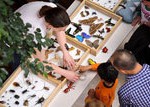Category Science & Technology
Artists, scientists collaborate on exhibit focusing on ecological change
In the popular imagination, the thought processes of artists and scientists could hardly be more distinct. And yet a year-long collaboration of lake scientists and artists from northern Wisconsin has engaged both sides of the "divide" in understanding and communicating the changing ecology in one of the world's densest group of lakes - in the northern highlands of Wisconsin.
Community and regional food systems study gets a boost from USDA
A University of Wisconsin–Madison study aimed at a better understanding of the ways to successfully develop sustainable local and regional food systems received a big boost this week (Monday, April 11) in the form of a $5 million grant from the U.S. Department of Agriculture (USDA).
Curiosities: Is global warming evident in temperature records and warming winters?
Indeed, and winter is actually warming faster than summer in Wisconsin, says Ankur Desai, an assistant professor of atmospheric and oceanic sciences at the…
ABC News global warming reporter to be science writer in residence
Bill Blakemore, who leads coverage of global warming for ABC News, is the spring science writer in residence at the University of Wisconsin–Madison.
New technology could stamp out bacteria in persistent wounds
Using an advanced form of a rubber stamp, researchers have developed a way to adhere an ultra-thin antibacterial coating to a wound.
New plan details Wisconsin’s potential to turn millions of exported energy dollars into revenues
A collaboration of researchers, business leaders, policymakers and industry experts has identified a plan for capitalizing on the biogas energy opportunity in Wisconsin.
Science is in your hands at annual Science Expeditions event
A little hands-on exploration can open a whole new world, and Science Expeditions — set for Saturday, April 2, this year — is a passport to the world of research at UW–Madison.
UW-Madison lake scientist gets world’s top water prize
Noted University of Wisconsin–Madison limnologist Stephen Carpenter has been awarded the 2011 Stockholm Water Prize, the world's most prestigious award for water-related activities, it was announced in Stockholm, Sweden today (Tuesday, March 22).
Curiosities: What is the flattest thing in the world?
The answer depends on many factors, including how the measurement is made and the scale of interest. “A mountain can look very rough, but if…
New imaging technique provides rapid, high-definition chemistry
FOR IMMEDIATE RELEASE 3/21/11
Aging rates, mortality gender gap similar across primates, study finds
Humans aren't the only ones who grow old gracefully, says a new study of primate aging patterns.
UW-Madison to host Science Olympiad National Tournament on May 18-21
More than 6,000 students, educators and parents from around the country will visit the University of Wisconsin–Madison Wednesday-Saturday, May 18-21, for the 27th annual Science Olympiad National Tournament.
Discovery Town Center debuts Saturday Science Series for families
The Wisconsin Institutes for Discovery Town Center will debut a new monthly series of free science exploration and education programs aimed at kids and families this Saturday March 5. Its first program, Leopold Discovery Day, invites learner of all ages to celebrate the life and discoveries of legendary University of Wisconsin–Madison environmentalist Aldo Leopold, known as the "father of wildlife management."
Ecological adaptation likely to influence impacts of climate change
Animals' capacity to adapt is a factor in how they are likely to respond to changing climate conditions.
Curiosities: Why, when I see wind generators on a windy day, are some rotating and others not?
There are several possible reasons why a turbine may be still even when the wind is blowing, says Giri Venkataramanan, a…



